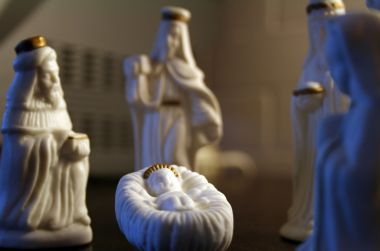Reflection: An inconvenient birth

"They were astounded at his teaching, for he taught them as one having authority, and not as their scribes." (Mark 1:22)
What do you do with an inconvenient birth?
The Austrian government is currently having difficulties trying to figure out what to do with the building in which Adolf Hitler was born after a government ministry which had occupied it for several decades moved out. It's scarcely surprising, really. After all, who wants to be associated with the birthplace of the megalomaniacal Nazi leader whose actions caused such death and suffering?
The birth of Jesus Christ is of course hugely different from that of Hitler. Nonetheless, it is, likewise, an inconvenient birth. For if the claim that this child is God incarnate has any truth to it, then that has certain implications. People might actually have to do something in response, for example.
And so over the years there have been a number of different ways of dealing with the Nativity. One is to brand Jesus' birth as illegitimate. For example, in the 2nd century, Celsus – a pagan, anti-Christian Greek philosopher – claimed that Jesus' father was in fact a Roman soldier.
A second approach is to denounce the whole idea as preposterous. Thus Richard Dawkins, in one of his delightfully dismissive pronouncements via Twitter, declared last year: "Gospels clearly mostly false (virgin birth, miracles etc). The possibility that Jesus didn't exist at all is of only marginal extra interest." So that's that, then!
Finally, as we are all only too aware at Christmastime, a third way of dealing with Christ's inconvenient birth is to cover it in saccharine. And so there are the seasonal cards depicting a golden-haired baby Jesus asleep in a luxury manger while a suspiciously western-looking Mary and Joseph, draped in some kind of spotless first-century designer outfits, gaze on smiling fondly.
All these approaches are predictable and, in a way, understandable. But the problem with them all is that they separate out the birth of Jesus from the rest of his life – including his teaching and his character.
For the Virgin Birth of Christ is not some bolt-on, standalone doctrine that is detachable from everything else in the gospels. Actually, it is part of an interwoven picture encompassing the whole of Jesus' life, death and resurrection.
When we look at Jesus' teaching, authority and personality, as well as his death, resurrection and miracles, and when we consider how all these things add up into something uniquely compelling, then the traditional accounts of the birth of Christ start to make perfect sense. In fact, those nativity accounts are wholly consistent with all that comes after.
We see this as we reach the next verses in our ongoing journey through Mark's gospel. As Jesus begins preaching, the people are "astonished at his teaching, for he taught them as one having authority, and not as their scribes," (Mark 1v22). And this of course is what you would expect if the preacher is God incarnate.
And when that same Jesus confronts evil in an individual he meets, prompting the terrified but revealing response, "What have you to do with us, Jesus of Nazareth? I know who you are, the Holy One of God," (v24) – again this is what we would anticipate if Christ is indeed God made man.
Claims about the virgin birth are not made in isolation from the rest of the gospel stories. And they tally with everything else we know about Jesus. As Professor Keith Ward, formerly of King's College, London, says in his booklet 'Evidence for the Virgin Birth': "If he is unique in his life and death, what is so strange in thinking that he is also unique in the manner of his birth?"
The Rough Guide to Discipleship is a fortnightly devotional series. David Baker is a former daily newspaper journalist now working as an Anglican minister in Sussex.











